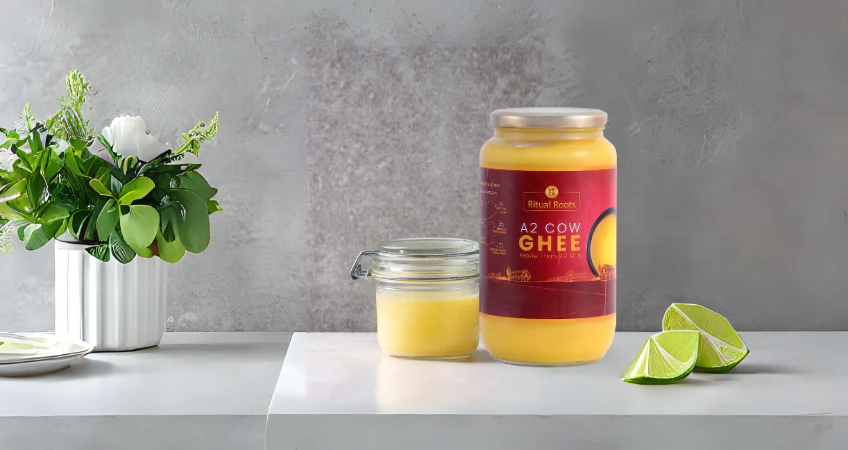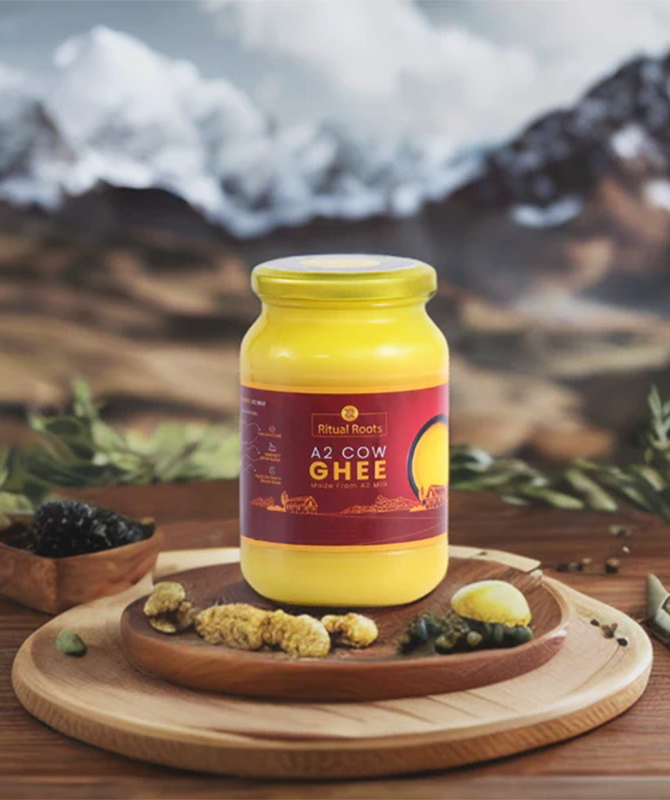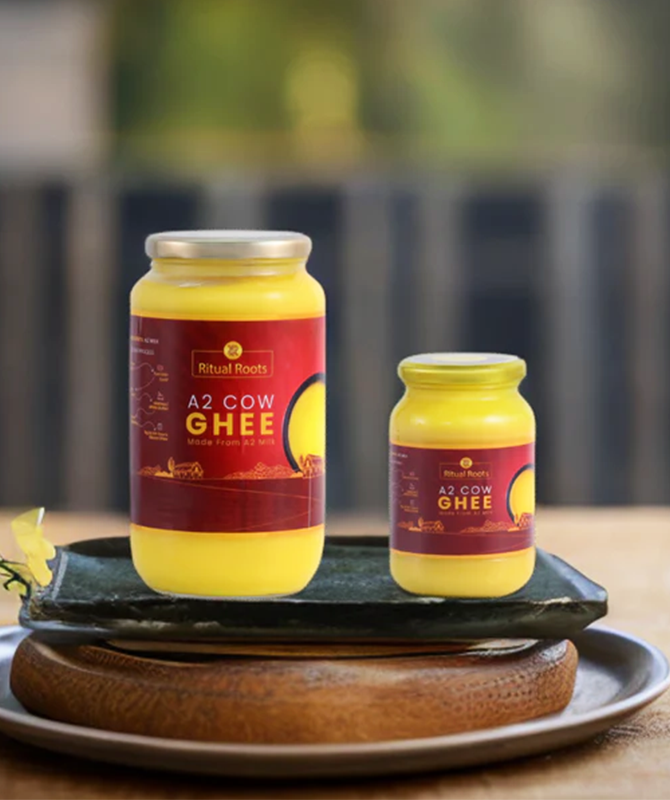How Long Does Ghee Last? A Guide to Storing Ghee Safely
Ghee, a staple in many kitchens worldwide, is cherished for its rich flavor, high smoke point, and numerous health benefits. Made by simmering butter to remove water and milk solids, this clarified butter has a longer shelf life than regular butter. However, storing ghee correctly is essential to maximize its longevity and quality.
This guide will delve into what ghee is, its shelf life signs it has gone bad, and the best ways to store it, ensuring you make the most of every jar.
What Is Ghee?
- Ghee, often clarified butter, is a traditional cooking fat from India. It is made by heating butter with no salt added to it until the water content has been driven off and the milk solids turn brown. These solids are removed, leaving behind a rich, golden liquid known as ghee. This process gives ghee its distinctive nutty aroma and flavor and eliminates lactose and casein, making it a good choice for those with dairy intolerance.
- Ghee is highly regarded in Indian, Middle Eastern, and Southeast Asian cuisines as a cooking medium and flavorful dish addition. Beyond its culinary uses, ghee is also a key component in Ayurvedic practices, praised for its potential health benefits, including supporting digestion and immunity.
Does Ghee Go Bad?
- While ghee does have a long shelf life, it is not immune to spoilage. Unlike regular butter, which contains water and milk solids that lead to quicker rancidity, ghee is almost entirely fat. This makes it more stable and less prone to spoilage. However, improper storage or exposure to heat, light, moisture, and air can cause ghee to oxidize and eventually go bad.
- When ghee spoils, it may develop off-flavors, unpleasant odors, or even mold. The good news is that if stored correctly, ghee can remain fresh for long, providing months or even years of use.
How Long Does Ghee Last?
The shelf life of ghee largely depends on how it is stored and whether it is store-bought or homemade:
- Unopened Store-Bought Ghee: Ghee purchased from stores typically comes in sealed glass jars or containers. When stored in a cool, dark place, unopened ghee can last up to two years or more from the date of manufacture. The best use-by date is mentioned on the packaging, and while unopened, ghee is usually good for months past this date if stored properly.
- Opened Ghee (Store-Bought or Homemade): Once opened, ghee’s shelf life starts to shorten, though it can still last quite a long time. For best results, use an opened jar of ghee within six months if stored at room temperature in a pantry. If refrigerated, ghee can last up to a year. Homemade ghee, made using traditional methods like the Bilona process, has similar storage guidelines.
- Homemade Ghee: Ghee prepared at home, especially through the Bilona ghee-making process, should be preserved in an airtight container and kept in a cool and dry place. Bilona Ghee, made using a slow-churning process, is often more aromatic and nutrient-rich than commercially made ghee. However, it is crucial to note that homemade ghee typically lacks preservatives in store-bought versions, making proper storage even more critical.
When Should You Throw Away Ghee?
There are a few tell-tale signs that your ghee has gone bad, and it’s time to discard it:
- Discoloration or Mold: Moisture or contaminants have entered the container if your ghee shows any signs of discoloration or mold growth. This can happen if the ghee is not stored in an airtight container or if a wet or dirty spoon is used to scoop it.
- Rancid Smell or Taste: Good-quality ghee has a natural nutty aroma and a slightly sweet flavor. If your ghee smells sour or bitter, it has likely turned rancid due to prolonged heat, light, or air exposure. Consuming rancid ghee is not recommended, as it can lead to digestive issues.
- Odd Texture: If your ghee has developed a grainy texture or looks cloudy, it might have started to degrade. While this does not always mean it is unsafe to consume, it does indicate that the quality has diminished.
- Age: If your ghee has been sitting on the pantry shelf for several years, even under ideal conditions, it is best to replace it with a fresh batch. Like any oil or fat, ghee loses its quality over time, affecting flavor and nutritional value.
How to Store Ghee?
Proper ghee storage is essential to retain its quality and extend its shelf life. Here are some tips to help you store ghee safely:
- Use an Airtight Container: Always store ghee in a well-sealed, airtight container to prevent contamination from moisture and other substances. Tightly sealed glass jars are the best for this purpose. Make sure that the jar is clean and dry before pouring ghee into it.
- Keep Away from Light and Heat: Ghee should be kept in a cool, dry place, preferably in a pantry or cupboard, and not in direct contact with sunlight or near heat sources like the stove.
- Refrigeration: While ghee can be stored at room temperature, refrigeration is an excellent option to extend its shelf life. Refrigerated ghee can last up to a year or more. Remember that cold ghee will solidify, similar to coconut oil, but it should remain soft enough to scoop out for use. If it becomes too hard, let it sit at room temperature for a while before using it.
- Freezing Ghee for Long-Term Storage: For those looking to store ghee for extended periods, freezing is a viable option. Store ghee in a sealed, airtight, and freezer-safe container or a plastic freezer bag and label it with the freezing date. While freezing can preserve ghee indefinitely, there may be a slight decline in quality over time. Avoid repeated freezing and thawing to prevent freezer burn and maintain freshness.
Conclusion
Ghee is a versatile and valuable ingredient in any kitchen, but like any other cooking fat, it requires proper storage to maintain its freshness and quality. Whether you’re using store-bought ghee or indulging in the rich flavors of homemade Bilona Ghee, ensuring it is stored correctly will help you enjoy its many long-term benefits. Be careful when using ghee and check for signs of spoilage, and when taking ghee, ensure you use a clean and dry spoon.
Ready to experience the purity of traditional ghee? Check out Ritual Roots for premium Bilona Ghee Price 1kg and Desi Cow Ghee Price 1kg to bring authentic taste and health benefits to your table!







